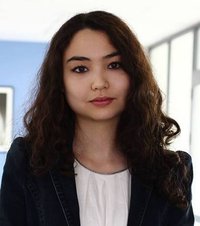Rovshen Shamedova

Rovshen Shamedova is a curious young person from Turkmenistan. She completed her BA in economics at the American University in Bulgaria and studied one semester as an exchange student at Facultés Universitaires Saint-Louis, Belgium. She also received her MSc in International Economics at the University of Nottingham, England, where she was a recipient of a full scholarship. Rovshen is fascinated with differing education systems across countries. Being able to speak five languages (Turkmen, Russian, Turkish, English and French), she is keen on traveling and exploring new languages, cultures and arts.
How and why did you decide to attend Memorial for your graduate degree?
After completing my Master of Science in International Economics, I worked for two years as a self-employed manager. I felt that something was missing, that the theoretical foundation I had built up throughout my studies was hollow without practice. Thus, I decided to apply for a graduate degree in applied economics. Canada in general was appealing to me with its top-ranked education system and when a friend of mine suggested Memorial University to me, I did some research to see if it would be a good fit. I found out that its economics department has been established by experts, specializing in economic development issues, particularly with respect to natural resources which happens to be the area of my interest. After my first communication with the graduate program coordinator and other staff throughout my application and admission process, I was fascinated with how organized and efficacious the system is. Now I know that I made the right choice by coming to Memorial.
What drew you to explore economics originally?
The globalization of economy is the reason that drew me to the field of economics. I became intrigued by the increasingly integrated world, with financial, natural and human capital breaking the barriers and transforming the nature of business and trade to a whole new global level which in turn led to the development of the countries.
Can you tell us a bit about your current projects?
My current projects consist of analyzing impacts of minerals and oil & gas production on labor market, environment as well as international trade.
A supervisor can be key to the success of any grad student. What does your supervisor (Dr. Roberto Martínez-Espiñeira) bring to their role as your advisor and mentor?
Dr. Martínez-Espiñeira is a great supervisor who is always ready to guide you whenever you ask and need an advice. He is passionate at what he does which is a key factor in motivating students.
Are you involved in any organizations on-campus or off? If so, can you explain and detail such involvement?
I am a member of TAUMUN (Teaching Assistants’ Union of Memorial University). As a graduate assistant I am helping professors in conducting research. I have also done some volunteer work at the St. John’s Farmers’ Market.
What do you like most about being a graduate student at Memorial?
I like Memorial’s diverse community in terms of both ethnic and academic background. Staff and students have a lot to offer and share and that makes my journey at Memorial so much interesting and stimulating.
What do you hope to do after completing your graduate degree?
I hope to find a job where I could apply my knowledge from interdisciplinary education in international and natural resource economics.